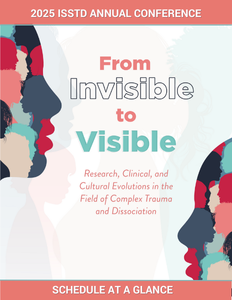Back
Posters
Poster Judging Hour
Randomized Controlled Trial of a Virtual Blended Psychoeducational Treatment for Adults with a History of Childhood Interpersonal Trauma: Primary Outcome
Friday, March 14, 2025
6:00 PM – 7:00 PM US Eastern Time
.jpeg.jpg)
Dana C. Ross, MD, MSc, FRCPC (she/her/hers)
Staff Psychiatrist
Women's College Hospital
Toronto, Ontario, Canada- NS
Negar Sayrafizadeh, MSc (she/her/hers)
Research Coordinator
Women's College Hospital, Ontario, Canada
Abstract
Background
Childhood trauma is widespread and associated with posttraumatic stress disorder (PTSD) in adulthood. The Trauma PORTAL (Providing Online tRauma Therapy using an Asynchronous Learning platform) is an 8-week psychoeducational program combining self-paced online modules with optional weekly one-hour virtual therapist-led group sessions, blending asynchronous and synchronous approaches. We evaluated the program’s efficacy in reducing PTSD symptoms in adults with a history of childhood trauma.
Methodology
This randomized, waitlist-controlled trial recruited outpatients waitlisted for a trauma therapy program in Toronto, Ontario. Participants were randomized 1:1 to the Trauma PORTAL (intervention) or a waitlist-control group. PTSD symptom severity was assessed using the self-report PTSD Checklist for DSM-5 (PCL-5) at week 8 (primary outcome). Secondary outcomes included the PCL-5 at week 16 and the Clinician-Administered PTSD Scale for DSM-5 (CAPS-5) at week 8 and 16. Analyses were intention-to-treat using repeated measures ANOVA.
Findings
Of 181 participants randomized (PORTAL: n=91; control: n=90), mean (SD) PCL-5 scores decreased from 49.19 (13.81) to 38.78 (13.16) in the PORTAL group and from 49.43 (14.11) to 45.13 (14.07) in controls, an adjusted mean difference (aMD) of -6.35 (95% CI -10.32 to -2.38) at week 8. The time x group interaction showed significant differences in PCL-5 score changes from baseline to week 8 between groups (p=0.002). Clinically significant reductions (≥10 points) occurred in 44.0% of the PORTAL group vs. 24.4% of controls (p=0.006). While the week 8 CAPS-5 aMD (-2.74, 95% CI -0.29 to 5.76) was non-significant, the time x group interaction for CAPS-5 showed significant differences in score changes (p=0.026). At 16 weeks, PCL-5 differences were sustained (aMD -7.51, 95% CI -12.03 to -2.99), and CAPS-5 differences became significant (aMD -4.86, 95% CI -7.93 to -1.79).
Conclusion
The Trauma PORTAL significantly reduces PTSD symptoms in adults with childhood trauma, supporting the use of virtual blended treatments.
Background
Childhood trauma is widespread and associated with posttraumatic stress disorder (PTSD) in adulthood. The Trauma PORTAL (Providing Online tRauma Therapy using an Asynchronous Learning platform) is an 8-week psychoeducational program combining self-paced online modules with optional weekly one-hour virtual therapist-led group sessions, blending asynchronous and synchronous approaches. We evaluated the program’s efficacy in reducing PTSD symptoms in adults with a history of childhood trauma.
Methodology
This randomized, waitlist-controlled trial recruited outpatients waitlisted for a trauma therapy program in Toronto, Ontario. Participants were randomized 1:1 to the Trauma PORTAL (intervention) or a waitlist-control group. PTSD symptom severity was assessed using the self-report PTSD Checklist for DSM-5 (PCL-5) at week 8 (primary outcome). Secondary outcomes included the PCL-5 at week 16 and the Clinician-Administered PTSD Scale for DSM-5 (CAPS-5) at week 8 and 16. Analyses were intention-to-treat using repeated measures ANOVA.
Findings
Of 181 participants randomized (PORTAL: n=91; control: n=90), mean (SD) PCL-5 scores decreased from 49.19 (13.81) to 38.78 (13.16) in the PORTAL group and from 49.43 (14.11) to 45.13 (14.07) in controls, an adjusted mean difference (aMD) of -6.35 (95% CI -10.32 to -2.38) at week 8. The time x group interaction showed significant differences in PCL-5 score changes from baseline to week 8 between groups (p=0.002). Clinically significant reductions (≥10 points) occurred in 44.0% of the PORTAL group vs. 24.4% of controls (p=0.006). While the week 8 CAPS-5 aMD (-2.74, 95% CI -0.29 to 5.76) was non-significant, the time x group interaction for CAPS-5 showed significant differences in score changes (p=0.026). At 16 weeks, PCL-5 differences were sustained (aMD -7.51, 95% CI -12.03 to -2.99), and CAPS-5 differences became significant (aMD -4.86, 95% CI -7.93 to -1.79).
Conclusion
The Trauma PORTAL significantly reduces PTSD symptoms in adults with childhood trauma, supporting the use of virtual blended treatments.

